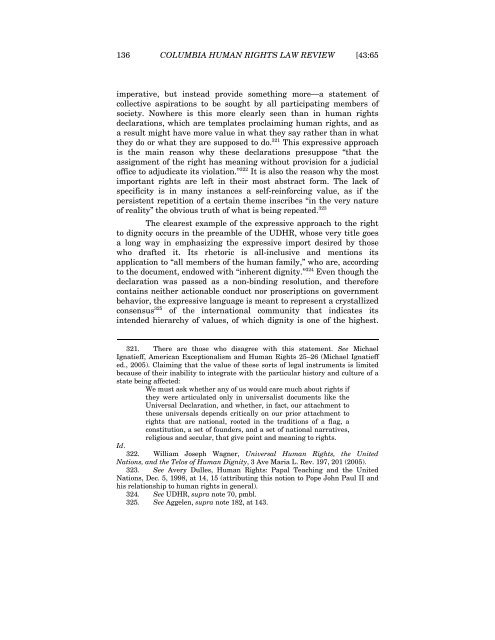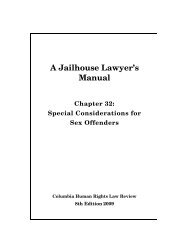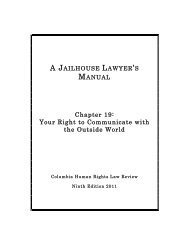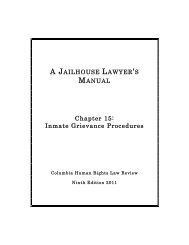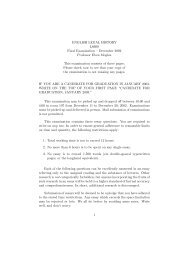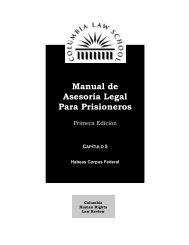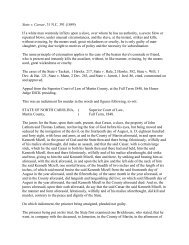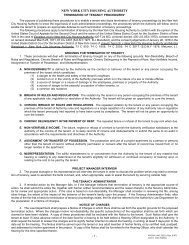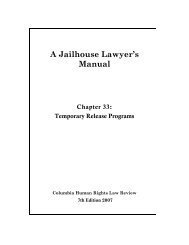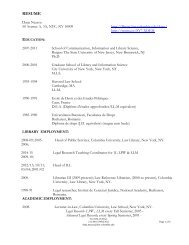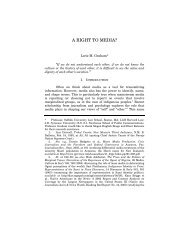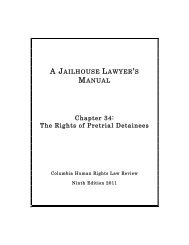The Right to Dignity Rex D. Glensy - Columbia Law School
The Right to Dignity Rex D. Glensy - Columbia Law School
The Right to Dignity Rex D. Glensy - Columbia Law School
Create successful ePaper yourself
Turn your PDF publications into a flip-book with our unique Google optimized e-Paper software.
136 COLUMBIA HUMAN RIGHTS LAW REVIEW [43:65<br />
imperative, but instead provide something more—a statement of<br />
collective aspirations <strong>to</strong> be sought by all participating members of<br />
society. Nowhere is this more clearly seen than in human rights<br />
declarations, which are templates proclaiming human rights, and as<br />
a result might have more value in what they say rather than in what<br />
they do or what they are supposed <strong>to</strong> do. 321 This expressive approach<br />
is the main reason why these declarations presuppose “that the<br />
assignment of the right has meaning without provision for a judicial<br />
office <strong>to</strong> adjudicate its violation.” 322 It is also the reason why the most<br />
important rights are left in their most abstract form. <strong>The</strong> lack of<br />
specificity is in many instances a selfreinforcing value, as if the<br />
persistent repetition of a certain theme inscribes “in the very nature<br />
of reality” the obvious truth of what is being repeated. 323<br />
<strong>The</strong> clearest example of the expressive approach <strong>to</strong> the right<br />
<strong>to</strong> dignity occurs in the preamble of the UDHR, whose very title goes<br />
a long way in emphasizing the expressive import desired by those<br />
who drafted it. Its rhe<strong>to</strong>ric is allinclusive and mentions its<br />
application <strong>to</strong> “all members of the human family,” who are, according<br />
<strong>to</strong> the document, endowed with “inherent dignity.” 324 Even though the<br />
declaration was passed as a nonbinding resolution, and therefore<br />
contains neither actionable conduct nor proscriptions on government<br />
behavior, the expressive language is meant <strong>to</strong> represent a crystallized<br />
consensus 325 of the international community that indicates its<br />
intended hierarchy of values, of which dignity is one of the highest.<br />
321. <strong>The</strong>re are those who disagree with this statement. See Michael<br />
Ignatieff, American Exceptionalism and Human <strong>Right</strong>s 25–26 (Michael Ignatieff<br />
ed., 2005). Claiming that the value of these sorts of legal instruments is limited<br />
because of their inability <strong>to</strong> integrate with the particular his<strong>to</strong>ry and culture of a<br />
state being affected:<br />
We must ask whether any of us would care much about rights if<br />
they were articulated only in universalist documents like the<br />
Universal Declaration, and whether, in fact, our attachment <strong>to</strong><br />
these universals depends critically on our prior attachment <strong>to</strong><br />
rights that are national, rooted in the traditions of a flag, a<br />
constitution, a set of founders, and a set of national narratives,<br />
religious and secular, that give point and meaning <strong>to</strong> rights.<br />
Id.<br />
322. William Joseph Wagner, Universal Human <strong>Right</strong>s, the United<br />
Nations, and the Telos of Human <strong>Dignity</strong>, 3 Ave Maria L. Rev. 197, 201 (2005).<br />
323. See Avery Dulles, Human <strong>Right</strong>s: Papal Teaching and the United<br />
Nations, Dec. 5, 1998, at 14, 15 (attributing this notion <strong>to</strong> Pope John Paul II and<br />
his relationship <strong>to</strong> human rights in general).<br />
324. See UDHR, supra note 70, pmbl.<br />
325. See Aggelen, supra note 182, at 143.


